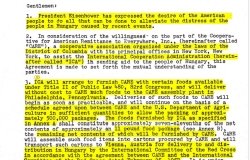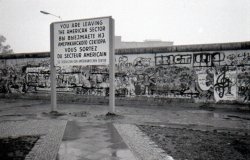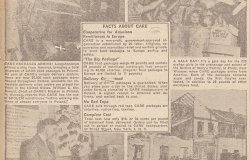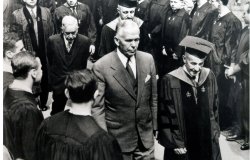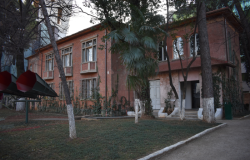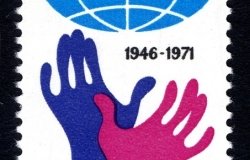The Cold War and the Korean Peninsula: <i>State Formation and Foreign Relations of North and South Korea</i>
Overview
On Friday, September 21, the Woodrow Wilson International Center for Scholars hosted an all-day conference entitled The Cold War on the Korean Peninsula: State Formation and Foreign Policy of North and South Korea. The event was co-sponsored by the North Korean International Documentation Project(NKIDP) and the Asia Program, Woodrow Wilson International Center for Scholars and the University of North Korean Studies, Seoul, with support from the Korea Foundation.
Each of the three panels focused on key time periods in the evolution of foreign policy on the Korean Peninsula from the 1950's to the present day North Korean nuclear crisis.
The conference began with opening remarks by History and Public Policy Program Director Dr. Christian Ostermann, and Ambassador Joun-yung Sun (University of North Korean Studies). Both speakers highlighted the strong relationship that exists between HAPP's North Korea International Documentation Project (NKIDP) and the University of North Korean Studies, (UNKS). This conference was the fourth of an ongoing joint conference series co-sponsored by UNKS and NKIDP.
Panel I, chaired by Ambassador Sun, focused on post-WWII North Korean internal politics and their relation to the DPRK's foreign policy. The first speaker, Professor Kihl-jae Ryoo, an NKIDP/HAPP visiting scholar at the Wilson Center, and professor at the University of North Korean Studies discussed various models for characterizing the North Korean system in the 1960's and 1970's, noting that while the terms "totalitarian," "absolutist," and "dictatorial" have been applied, he considers the term "sultanistic" to be most accurate. Ryoo also noted in his remarks that the late 1960's and early 1970's were a key era in the development of the North Korean political system. During this time Kim Il-Sung laid the groundwork for his cult of personality, solidified the Korean Workers' Party's monolithic position in the DPRK's leadership, and prepared his son, Kim Jong-Il, for his dynastic succession to the position of supreme leader. While North Korea's government is often described as static, Professor Ryoo demonstrated that the late 1960's and early 1970's were a time when dramatic upheavals within North Korea's government proved to be decisive in the future development of North Korean foreign and domestic policies.
Turning to an earlier, but no less important phase of North Korea's history, NKIDP Coordinator James Person, discussed the myth of factionalism as it relates to North Korean political history. Specifically, he noted that recently declassified evidence from the archives of North Korea's former fraternal communist allies suggests that opposition to Kim Il-Sung from within the Korean Workers' Party began as early as 1953, and that this opposition came from a broad spectrum of party members that crossed what have long been held to be rigid factional lines. These opponents had legitimate concerns about Kim Il-Sung's economic development model that was based solely upon heavy industry and ignored consumer goods. The myth of factionalism arose only after Kim Il-Sung publicly denounced his opponents as ‘factionalists' following the August 1956 Plenum of the KWP Central Committee in order to create artificial divisions among them. According to Person, this was merely a semantic tactic for dividing his opponents. The myth of factionalism has persisted in the West for so long merely because historians have, until recently, lacked original documents to disprove it.
Commentators Charles K. Armstrong (Columbia University) and Narushige Michishita (Johns Hopkins SAIS) illuminated many of the strengths and weaknesses of both presenters' papers. Discussing Professor Ryoo's Paper, Charles Armstrong described in greater detail how Kim Il-Sung used perceived external threats to North Korean sovereignty as an excuse for the deepening of the dictatorship, but he objected to Ryoo's use of the term ‘sultanistic' to describe the nature of the regime, stating that this term was an example of "orientalism at its worst." In agreeing with James Person, Armstrong noted that during the mid 1950's the South Korean government was actually far more inclined to factionalism than that of the North. He suggested that Person strengthen his argument by going beyond the unprecedented levels of cooperation between members of alleged "factions" to highlight even more revealing evidence that "punctures the myth of factionalism" in North Korea. Narushige Michishita added depth to Professor Ryoo's discussion of the 1960's and 1970's as an era of change in North Korea, by explaining how the North Korean attack on the Blue House was executed solely by generals in the North Korean Army, without the prior knowledge of Kim Il-Sung.
Panel II was chaired by James Person, and focused on the Korean Peninsula during the mid 1960's through the 1980's. Professor Sung-ji Woo (Kyunghee University in Suwon, South Korea) opened the panel by speaking on the security triangle that was formed in the late 1960's between the US, South Korea, and North Korea. At this time, Seoul's relations with Pyongyang were poor due to several instances of North Korean ‘militaristic adventurism,' including the 1968 raid on South Korea's Blue House. Because of North Korea's emphasis on military actions, its economy was suffering, and Pyongyang desperately wanted to engage in a bilateral dialogue with Washington. Meanwhile, in South Korea, President Park Chung-hee had initiated sweeping economic reforms, and the newly prosperous South Korean people began to question his legitimacy as their ruler. In response to this domestic instability, at the suggestion of the Korean Central Intelligence Agency (KCIA), President Park began inter-Korean peace talks in 1972. Professor Woo emphasized that even though the talks were bilateral, and were immediately spurred by domestic political considerations, US pressure to initiate an inter-Korean dialogue had begun in 1969. Therefore the influence of the US side of the strategic triangle was significant.
Professor Charles K. Armstrong (Columbia University) spoke about how North Korea served as a model for economic development for many Third World countries throughout the 1970's. The DPRK's ‘Juche' model of development was characterized by self-reliance, and emphasized heavy industry over consumer goods. North Korea tried to export this model to the Third World as part of its effort to surpass the South in terms of diplomatic relations with the rest of the world. North Korea initially targeted North Vietnam as a partner in economic development because Kim Il-Sung saw many parallels between the two countries' struggles with the US. When this effort proved to be largely unsuccessful due to Ho Chi Minh's lack of interest in North Korean aid, the DPRK shifted its focus to Africa. In Africa, certain elements of Juche caught on, including North Korean-style mass games, however, many other North Korean initiatives, including attempts to grow rice in Southern Ethiopia, failed spectacularly. Armstrong therefore concluded that Juche was never a viable model for economic development anywhere except North Korea, because it relied on a leader, and a set of circumstances which were unique to the DPRK.
Professors Bernd Schaefer, (CWIHP) Jong-dae Shin, (UNKS) and Gregg Brazinsky (GWU) provided commentary on Armstrong and Woo's papers. Professor Shin largely agreed with Professor Woo, and reinforced Woo's thesis by highlighting that fact that the military crises created by the North Koreans only served to strengthen the United States' relative influence in the security triangle. Gregg Brazinsky, on the other hand, suggested that a security hexagon, which would also incorporate Japan, the Soviet Union, and the PRC would have been a more accurate and nuanced model for Woo to base his paper. Finally, Bernd Schaefer elaborated upon the complex interactions that took place between North Korea and China on economic issues following the beginning of Mao's Cultural Revolution and the ensuing break in relations which resulted from his efforts to convince Kim Il-Sung to begin a similar revolution in the DPRK.
Following a break for lunch, the conference concluded with Panel III, which was chaired by Don Oberdorfer and featured Ambassadors Joun-yung Sun and Jack Pritchard (KEI) discussing the future of inter-Korean relations and the Korean Peninsula's ongoing nuclear crisis. Ambassador Sun spoke out against South Korean President Roh Moo-hyun's decision to hold bilateral negotiations with the North. According to Ambassador Sun, because President Roh is so near to the end of his term, Kim-jong Il has little to lose in joining the talks, and President Roh has little leverage with which to effect meaningful change. This is especially true because of President Roh's statement that the bilateral negotiations would not include discussion of the nuclear issue, and the fact that any agreement to conclude a peace treaty to officially end the Korean War would require the participation of all of the countries who signed the 1953 Armistice. For these reasons, according to Ambassador Sun, South Korea has little to gain from these negotiations, while the DPRK will have the opportunity to use them as a platform for propaganda.
Ambassador Pritchard spoke about the Bush Administration's policy on North Korean nuclear proliferation, and how it has been affected by domestic politics here in the US. Specifically, he advanced the thesis that following the Republican Party's losses in the midterm elections, and the resignation of many of President Bush's key advisors, including Donald Rumsfeld and John Bolton, Ambassador Christopher Hill, and Secretary of State Condoleeza Rice were able to convince President Bush to soften his stance on direct US/DPRK negotiations. The beginning of bilateral talks between the US and North Korea, even though they occurred within the context of the six-party talks, rapidly led to an agreement with the North Koreans, and the first phase of the agreement to shut down the DPRK's nuclear program has been completed. The second phase, on the other hand, has been bogged down for months because, unlike the first phase, it does not yet have an implementation timeline. Nevertheless, Pritchard remained cautiously optimistic that in spite of the difficulty of goading the North Koreans into action, and the cost and technical complexity of dismantling North Korea's nuclear infrastructure in an environmentally conscious manner, the goal of de-nuclearizing the Korean Peninsula is an achievable goal.
Professor Jae-jung Suh, (SAIS) and Deputy Director of Korean Affairs for the US State Department Maureen Cormack, weighed in with their own analysis following the Ambassadors' comments. Professor Suh suggested that contrary to popular sentiment, the DPRK is a relatively easy negotiating partner because its demands have remained consistent for years, while the US unnecessarily complicates the negotiation process through its frequent policy changes. Deputy Director Cormack expressed optimism that North Korea's offer to open its nuclear facilities to international inspectors last week demonstrated that the US/DPRK bilateral talks had achieved concrete successes, and she suggested that a six-party ministerial meeting was a realistic possibility for the future.
Hosted By

Cold War International History Project
The Cold War International History Project supports the full and prompt release of historical materials by governments on all sides of the Cold War. Through an award winning Digital Archive, the Project allows scholars, journalists, students, and the interested public to reassess the Cold War and its many contemporary legacies. It is part of the Wilson Center's History and Public Policy Program. Read more

History and Public Policy Program
The History and Public Policy Program makes public the primary source record of 20th and 21st century international history from repositories around the world, facilitates scholarship based on those records, and uses these materials to provide context for classroom, public, and policy debates on global affairs. Read more

Indo-Pacific Program
The Indo-Pacific Program promotes policy debate and intellectual discussions on US interests in the Asia-Pacific as well as political, economic, security, and social issues relating to the world’s most populous and economically dynamic region. Read more

North Korea International Documentation Project
The North Korea International Documentation Project serves as an informational clearinghouse on North Korea for the scholarly and policymaking communities, disseminating documents on the DPRK from its former communist allies that provide valuable insight into the actions and nature of the North Korean state. It is part of the Wilson Center's History and Public Policy Program. Read more
Thank you for your interest in this event. Please send any feedback or questions to our Events staff.
